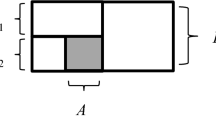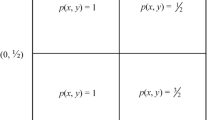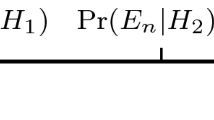Abstract
Lewis proved a Dutch book theorem for Conditionalization. The theorem shows that an agent who follows any credal update rule other than Conditionalization is vulnerable to bets that inflict a sure loss. Lewis’s theorem is tailored to factive formulations of Conditionalization, i.e. formulations on which the conditioning proposition is true. Yet many scientific and philosophical applications of Bayesian decision theory require a non-factive formulation, i.e. a formulation on which the conditioning proposition may be false. I prove a Dutch book theorem tailored to non-factive Conditionalization. I also discuss the theorem’s significance.


Similar content being viewed by others
Notes
An anonymous referee suggests that, when a scientist conditionalizes on E, she engages in a kind of idealization: she takes E to be true for certain purposes, or in certain theoretical contexts, despite knowing that E may be false or even that E is false. However, classifying some aspect of scientific practice as an idealization does not exempt us from limning the norms that govern it. Scientific idealizations also fall under norms. Even if we grant that a scientist’s newfound certainty in E is an idealizing assumption, there are still better and worse ways for her to adjust her other credences in light of her idealizing assumption. Codifying which ways are better and which ways are worse requires us to articulate a norm governing idealizing assumptions of this general kind. Articulating such a norm carries us back to non-factive Conditionalization or some norm in that vicinity (e.g. an otherwise similar norm that relativizes credal assignments to certain theoretical contexts).
Rescorla (2015) offers a philosophically oriented introduction to rcds. There are several alternative frameworks for analyzing conditional probability when P(E) = 0. Easwaran (2019) gives a balanced survey, from a perspective sympathetic to rcds. Note that the word “regular” in “regular conditional distribution” has nothing to do with the doctrine (Regularity) that metaphysically possible propositions should receive positive credence. This is an unfortunate case where the literature associates the same word, “regular,” with two completely different meanings.
Titelbaum’s (2013) Certainty-Loss Framework can also model situations where the agent becomes certain of E but subsequently gains evidence that eradicates her certainty in E. As Titelbaum admits (2013, pp. 296–298), though, the Certainty-Loss Framework does not fully analyze key aspects of such situations.
Rescorla (2018) proves a Dutch book theorem and converse Dutch book theorem for conditionalization using rcds. However, the proof assumes a factive setting. In future work, I will discuss rcds from a non-factive perspective. I will also analyze in more detail how conditionalization using rcds can eradicate certainties, including certainties gained by previously conditionalizing on a proposition E.
Lewis’s exposition has several idiosyncratic features that it would be distracting for us to consider in depth. For example, he assumes that partition propositions “specify, in full detail, all the alternative courses of experience [the agent] might undergo between time 0 and time 1” (1999, p. 405). I track Skyrms’s (1987b) exposition rather than Lewis’s. But the core ideas are due to Lewis.
Lewis’s proof also depends on the assumption that the agent follows a deterministic update rule. The proof does not apply to an agent who violates Conditionalization by employing a stochastic credal reallocation strategy (e.g. an agent who randomly selects a new credal allocation at t2). I will follow Lewis by restricting attention to deterministic rather than stochastic credal reallocation strategies.
Skyrms’s discussion of Jeffrey Conditionalization assumes that the agent does not become certain of a partition proposition at t2. Nevertheless, his proof readily generalizes to yield the results summarized in the next paragraph.
I assume that the agent’s credences at t3 are given by \(P(\,\cdot\,|E)\), where E is the true partition proposition revealed by the oracle at t3. (If the assumption is false, then the bookie can impose a Dutch book simpliciter using Lewis’s strategy for times t1 and t3, bypassing t2.) Under my assumption, the bookie can mount a semi-Dutch book by exploiting the disparity between the agent’s credences at t2 and t3 in the case where Pnew(E*) = 1.
Here one must allow second-order bets, i.e. bets over the agent’s own credences at t2. See Skyrms (1987b) for mathematical and philosophical details.
A common way to explicate utility is through a representation theorem. A typical representation theorem entails that, when an agent’s preferences satisfy certain constraints, we can represent her as having credences and utilities that determine her preferences via expected utility maximization. Ramsey (1931) proved the first such representation theorem and, on that basis, defended a version of Bayesianism. The ensuing literature offers additional representation theorems that improve upon Ramsey’s, often assigning the theorems a foundational role. For example, Jeffrey (1983) highlights a representation theorem proved by Bolker (1967), while Joyce (1999) proves a representation theorem for causal decision theory. Kaplan (1996, pp. 155–180) and Maher (1993, pp. 94–104) suggest that, given the apparent need to bring utilities into Dutch book arguments, we are better off abandoning Dutch book argumentation and appealing instead to a suitable representation theorem. However, representation theorems only apply to credences at a moment of time. Even if they yield a compelling justification for synchronic Bayesian norms, they do not seem well-suited to support a diachronic norm such as Conditionalization.
van Fraassen (1984) gives a diachronic Dutch book argument for the Principle of Reflection. His argument, like Lewis’s original diachronic book argument for Conditionalization, assumes a factive setting. In future work, I will discuss how the diachronic Dutch book argument for Reflection fares once we reject factivity assumptions.
Briggs and Pettigrew (2020) give an accuracy-dominance argument for Conditionalization. They prove that an agent who violates Conditionalization could have guaranteed an improved accuracy score by instead obeying Conditionalization. Their proof implicitly assumes a factive setting.
References
Armendt, B. (1980). Is there a Dutch book argument for probability kinematics? Philosophy of Science, 47, 583–588.
Armendt, B. (1993). Dutch books, additivity, and utility theory. Philosophical Topics, 21, 1–20.
Arntzenius, F. (2003). Some problems for conditionalization and reflection. The Journal of Philosophy, 100, 356–370.
Ashby, D. (2006). Bayesian statistics in medicine: A 25 year review. Statistics in Medicine, 25, 3589–3631.
Billingsley, P. (1995). Probability and measure (3rd ed.). New York: Wiley.
Bolker, E. (1967). A simultaneous axiomatization of utility and subjective probability. Philosophy of Science, 34, 333–340.
Briggs, R. (2009). Distorted reflection. Philosophical Review, 118, 59–85.
Briggs, R., & Pettigrew, R. (2020). An accuracy-dominance argument for conditionalization. Nous, 54, 162–181.
Buchak, L. (2013). Risk and rationality. Oxford: Oxford University Press.
Christensen, D. (1991). Clever bookies and coherent beliefs. Philosophical Review, 100, 229–247.
de Finetti, B. (1937/1980). Foresight. Its logical laws, its subjective sources. Rpt. in H. E. Kyburg, Jr. & H. E. Smokler (Eds.), Studies in subjective probability (pp. 94–158). Huntington: Robert E. Krieger.
de Finetti, B. (1974). Theory of probability (Vol. 1). New York: Wiley.
Earman, J. (1992). Bayes or bust?. Cambridge: MIT Press.
Easwaran, K. (2011). Bayesianism I: Introduction and arguments in favor. Philosophy Compass, 6, 312–320.
Easwaran, K. (2013). Expected accuracy supports conditionalization—and conglomerability and reflection. Philosophy of Science, 80, 119–142.
Easwaran, K. (2014). Regularity and hyperreal credences. Philosophical Review, 123, 1–41.
Easwaran, K. (2019). Conditional probabilities. In R. Pettigrew & J. Weisberg (Eds.), The open handbook of formal epistemology (pp. 131–198). London: PhilPapers.
Fudenberg, D., & Tirole, J. (1991). Game theory. Cambridge: MIT Press.
Ghosal, S., & van der Vaart, A. (2017). Fundamentals of nonparametric Bayesian inference. Cambridge: Cambridge University Press.
Greaves, H., & Wallace, D. (2006). Justifying conditionalization: Conditionalization maximizes expected epistemic utility. Mind, 115, 607–632.
Hacking, I. (1967). Slightly more realistic personal probability. Philosophy of Science, 34, 311–325.
Hájek, A. (2009). Dutch book arguments. In P. Anand, P. Pattanaik, & C. Puppe (Eds.), The handbook of rationality and social choice (pp. 173–195). Oxford: Oxford University Press.
Howson, C., & Franklin, A. (1994). Bayesian conditionalization and probability kinematics. The British Journal for the Philosophy of Science, 45, 451–466.
Huber, F. (2016). Formal representations of belief. In E. Zalta (Ed.), The Stanford encyclopedia of philosophy (Spring 2016). http://plato.stanford.edu/archives/spr2016/entries/formal-belief/.
Jeffrey, R. (1983). The logic of decision (2nd ed.). Chicago: University of Chicago Press.
Jeffrey, R. (2004). Subjective probability: The real thing. Cambridge: Cambridge University Press.
Joyce, J. (1998). A nonpragmatic vindication of probabilism. Philosophy of Science, 65, 575–603.
Joyce, J. (1999). The foundations of causal decision theory. Cambridge: Cambridge University Press.
Kahneman, D., & Tversky, A. (1979). Prospect theory: An analysis of decision under risk. Econometrica, 47, 263–291.
Kaplan, M. (1996). Decision theory as philosophy. Cambridge: Cambridge University Press.
Knill, D., & Richards, W. (Eds.). (1996). Perception as Bayesian inference. Cambridge: Cambridge University Press.
Leitgeb, H., & Pettigrew, R. (2010a). An objective justification of Bayesianism I: Measuring inaccuracy. Philosophy of Science, 77, 201–235.
Leitgeb, H., & Pettigrew, R. (2010b). An objective justification of Bayesianism II: The consequences of minimizing inaccuracy. Philosophy of Science, 77, 236–272.
Levi, I. (1987). The demons of decision. Monist, 70, 193–211.
Lewis, D. (1999). Why conditionalize?. In Papers in metaphysics and epistemology. Cambridge: Cambridge University Press.
Maher, P. (1992). Diachronic rationality. Philosophy of Science, 59, 120–141.
Maher, P. (1993). Betting on theories. Cambridge: Cambridge University Press.
Ramsey, F. P. (1931). Truth and probability. In R. B. Braithwaite (Ed.), The foundations of mathematics and other logical essays (pp. 156–198). London: Routledge and Kegan.
Rescorla, M. (2018). A Dutch book theorem and converse Dutch book theorem for Kolmogorov conditionalization. The Review of Symbolic Logic, 11, 705–735.
Rescorla, M. (2019). On the proper formulation of conditionalization. Synthese. https://doi.org/10.1007/s11229-019-02179-9.
Schoenfield, M. (2017). Conditionalization does not (in general) maximize expected accuracy. Mind, 504, 1155–1187.
Shimony, A. (1955). Coherence and the axioms of confirmation. Journal of Symbolic Logic, 20, 1–28.
Skyrms, B. (1980). Causal necessity. New Haven: Yale University Press.
Skyrms, B. (1987a). Coherence. In N. Rescher (Ed.), Scientific inquiry in philosophical perspective. Pittsburgh: University of Pittsburgh Press.
Skyrms, B. (1987b). Dynamic coherence and probability kinematics. Philosophy of Science, 54, 1–20.
Skyrms, B. (1992). Coherence, probability, and induction. Philosophical Issues, 2, 215–226.
Skyrms, B. (1993). A mistake in dynamic coherence arguments? Philosophy of Science, 60, 320–328.
Talbott, W. (2015). Bayesian epistemology. In E. Zalta (Ed.), The Stanford encyclopedia of philosophy (Summer 2015). http://plato.stanford.edu/archives/sum2015/entries/epistemology-bayesian/.
Teller, P. (1973). Conditionalization and observation. Synthese, 26, 218–258.
Thrun, S., Burgard, W., & Fox, D. (2005). Probabilistic robotics. Cambridge: MIT Press.
Titelbaum, M. (2013). Quitting certainties. Oxford: Oxford University Press.
van Fraassen, B. (1984). Belief and the will. The Journal of Philosophy, 81, 235–256.
van Fraassen, B. (1999). Conditionalization, a new argument for. Topoi, 18, 93–96.
Vineberg, S. (2011). Dutch book arguments. In E. Zalta (Ed.), The Stanford encyclopedia of philosophy (Summer 2011). http://plato.stanford.edu/archives/sum2011/entries/dutch-book/.
Weisberg, J. (2009). Varieties of Bayesianism. In D. Gabbay, S. Hartman, & J. Woods (Eds.), Handbook of the history of logic (Vol. 10, pp. 447–551). New York: Elsevier.
Williamson, T. (2000). Knowledge and its limits. Oxford: Oxford University Press.
Acknowledgements
I am grateful to Brian Skyrms, Simon Huttegger, and Alan Hájek for helpful discussion of these issues. I also thank two anonymous referees for this journal for comments that improved the paper.
Author information
Authors and Affiliations
Corresponding author
Additional information
Publisher's Note
Springer Nature remains neutral with regard to jurisdictional claims in published maps and institutional affiliations.
Rights and permissions
About this article
Cite this article
Rescorla, M. An Improved Dutch Book Theorem for Conditionalization. Erkenn 87, 1013–1041 (2022). https://doi.org/10.1007/s10670-020-00228-1
Received:
Accepted:
Published:
Issue Date:
DOI: https://doi.org/10.1007/s10670-020-00228-1




